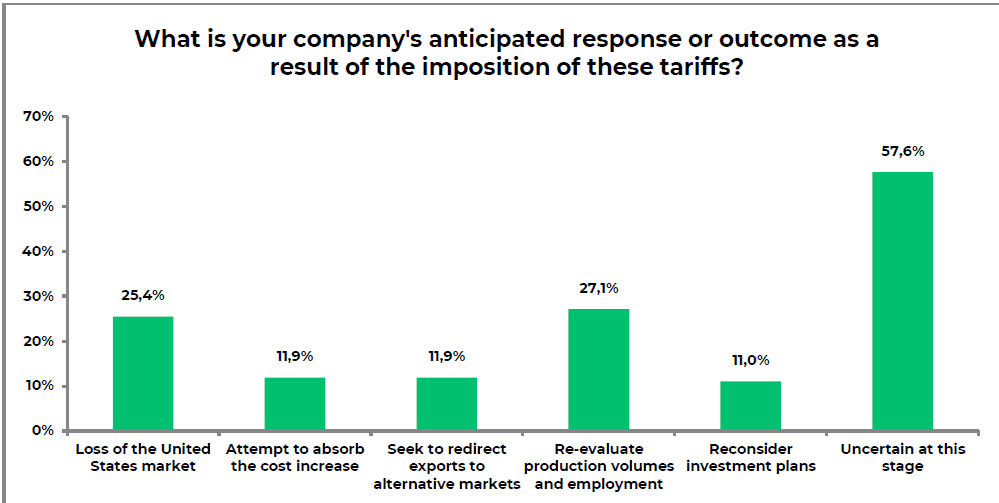The effect of the US tariff on South African goods could cause many job losses in the metals and engineering sector and cause companies to close.

The US tariff imposed on goods from South Africa exported to the United States poses an existential threat for some companies in the metals and engineering sector, according to a survey among SEIFSA member companies that showed 33.3% of companies in this sector are affected.
The US announced a 30% import tariff on South African exports that will come into effect on Friday. This development prompted widespread concern in the South African metals and engineering sector, which relies on the US for approximately 8% of its total output.
The Steel and Engineering Industries Federation of Southern Africa (SEIFSA) then conducted a snap survey across its membership base to assess the likely implications. SEIFSA received 126 responses from member companies and used it to compile an initial report on the impact of US tariffs on the metals and engineering sector.
This report combines the quantitative as well as the qualitative feedback received and identifies the direct and indirect effects on companies, the market alternatives considered and notable initial perspectives emerging from the sector.
ALSO READ: Act now to absorb impact of Trump tariffs on SA vehicle manufacturing sector – BLSA
US tariffs in the metals and engineering sector
According to the report, the self-reported exposure to the US tariffs can be categorised like this:
- Directly affected (revenue/job losses): 33.3%
- Indirectly affected (supply chain/economy): 23.8%
- Exploring alternative markets: 15.9%
- Uncertain about impact: 14.3%
- Unaffected: 12.7%
Tafadzwa Chibanguza, CEO designate of SEIFSA, says these figures show that while not every respondent is directly exposed to the tariff, the majority anticipate either direct or cascading economic consequences which demonstrates the interconnectedness of the metals and engineering ecosystem.
According to the survey, 71.1% of the respondents operate in the downstream value chain, while 13.3% operate in other value chains, 9.4% in the midstream (fabrication, processing and casting) and 6.3% upstream in metal production.
Only 34.9% of the respondents export directly to the US, while 11.6% export indirectly through a value chain and 53.5% do not export to the US at all. Among those that do export to the US, 72.4% said up to 25% of their total sales are to the US, while 18.4% said it is the case for 26% to 50% of their exports, 51%-75% for 3.5% of the respondents and 76% to 100% for 5.8% of the respondents who export to the US.
When the respondents were asked if they have long-term contracts with US-based customers that could be affected, 27.3% said yes, while 64.8% said no and 7.8% were not sure.
Asked about their company’s anticipated response or outcome as a result of the tariffs, these were their answers:

What worries companies about US tariffs
The respondents also gave these open-ended responses
- A significant number of respondents reported that the new tariffs would have severe and immediate consequences for their businesses. Many companies anticipate a dramatic drop in sales, with some stating that the US accounts for up to 20% of their turnover. The expected revenue declines are estimated at 10–20%.
- Several respondents indicated that if the tariffs persist, they would be forced to reduce their workforce or even close operations. In addition, some companies had to reconsider or halt planned investments. One notable case involved the redirection of equipment and production intended for the United States to another subsidiary, leading to the effective shutdown of a new South African facility.
- Manufacturers also expressed concerns about production uncertainty, especially where their product offerings are specifically tailored to US market demand.
- While some companies acknowledged the existence of alternative markets, most noted that these are limited and already under pressure. Asian suppliers, particularly from China, are aggressively pricing into African markets, making it difficult to shift exports regionally.
- Furthermore, protectionist policies in other countries have made export diversification even more challenging.
- Several companies reported a trade diversion effect, where redirected global supply chains have led to increased competition from lower-priced imports in key third markets, eroding South African competitiveness. Even companies not directly exporting to the US are bracing for spillover effects.
- Suppliers to exporters are anticipating reduced orders, while increased global steel prices and constrained access to key materials are expected to raise input costs.
- Respondents also flagged broader macroeconomic concerns, including rising inflation, decreased gross domestic product and worsening unemployment.
- There is a general sense of uncertainty, with companies citing delayed orders, client hesitation and investor risk aversion as immediate consequences.
ALSO READ: ‘It’s just gone’ – Trump’s tariffs cost SA company R750m overnight
US tariff responses from the metals and engineering sector
These notable observations emerged from the responses:
- While some companies reported being unaffected, others described the tariffs as an existential threat, underscoring the uneven exposure within the sector.
- There were multiple calls for government intervention through export diversification incentives, financial support and stronger trade diplomacy. Some respondents criticised broader industrial policy frameworks, arguing that structural issues, such as high labour costs and electricity tariffs already undermined competitiveness before the tariffs were imposed.
- Lastly, one respondent highlighted the adverse impact on emerging green technology, noting that its unique energy-efficient product, which showed great promise, is now facing reduced demand due to the tariff-related uncertainty.
Chibanguza says these responses show that the 30% US tariff is expected to have a significant and multidimensional impact on the South African metals and engineering sector.
“While not all companies are directly affected, the broader ecosystem, including suppliers, customers and competitors, face serious disruption.”
ALSO READ: Concern about SA steel industry: Trump’s tariffs and ArcelorMittal closure looming






